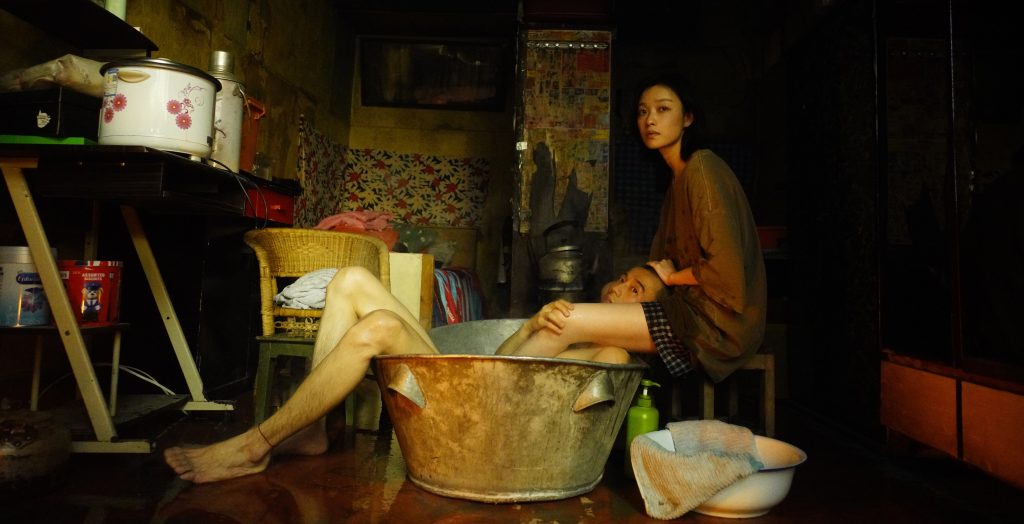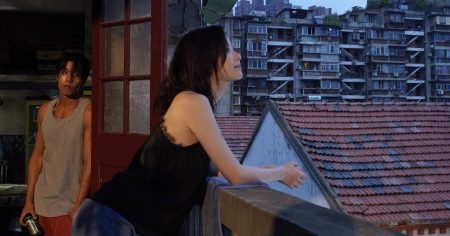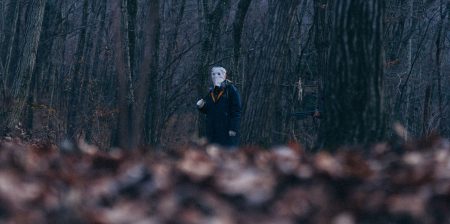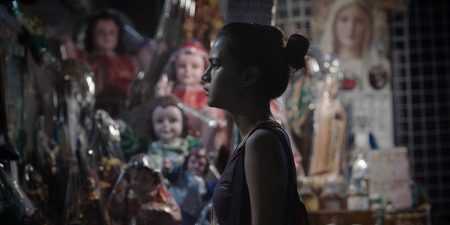
Bound in Heaven (Huo Xin, China 2024)
 Bound in Heaven (Huo Xin, China 2024)
Bound in Heaven (Huo Xin, China 2024)
After an esteemed 26-year career writing for the likes of Stephen Chow (Kung Fu Hustle, Journey to the West: Conquering the Demons) and being the go-to scribe of Zhang Yang (Shower, Quitting, Sunflower), screenwriter Huo Xin strikes out with an outstanding directorial debut by adapting Li Xiuwen’s eponymous 2003 novel about an abused woman who crosses paths with a dying man. Carefree city slicker Xia You (Ni Ni) lives under the thumb of her brutish fiancé (Liao Fan, always menacing) until she has an intense fling with charming but footloose scalper Xu Zitai (a consummate Zhou You) following a Faye Wong concert in Shanghai. A second chance encounter between the pair in Wuhan several months later draws them into a bond so deep that You does not look back, even after learning that Zitai has terminal cancer and witnessing his parents disown him for being unfilial. By the time the couple embarks on a freewheeling journey inland to Chongqing, they have become firm partners in crime. The choice of setting, filming and timestamping the story’s three chapters across Shanghai, Wuhan and Chongqing was inspired by Faye Wong’s international Comeback Tour of 2010-2012, which had sequential stops in these three cities.
 Cloud (Kurosawa Kiyoshi, Japan 2024)
Cloud (Kurosawa Kiyoshi, Japan 2024)
Whatever aesthetic pretensions tastemakers and fans have ascribed to the work of the only other famed filmmaker named Kurosawa, Kiyoshi-san’s new film still has the charisma of a satisfying crime flick and suspense thriller at entry level. When Ryosuke (Suda Masaki) sees a bright future in flipping random goods online, he quits his factory labourer job to establish a full-time reselling business. Not even his boss’s (Arakawa Yoshiyoshi) dangling of a managerial promotion or his business mentor’s (Kubota Masataka) nudge to reteam on small reselling gigs can sway him from the pulse of financial independence. With eccentric girlfriend Akiko (Furukawa Kotone) in tow, Ryosuke relocates to a rental loft in the mountains where he hires an enigmatically loyal assistant Sano (Okudaira Daiken) to help manage his business. Already under a cloud for his ambition and series of unethical decisions, Ryosuke begins to cross several red lines in his community so that he easily becomes a target of retribution. Nominally a director of ‘psychological horror’ films involving supernatural elements, Kurosawa’s interests are far broader and his latest original tale may ironically be his first attempt at exploring the real psychological horrors of capitalism, notably its barren illusion and high body count.
 Daughter’s Daughter (Huang Xi, Taiwan 2024)
Daughter’s Daughter (Huang Xi, Taiwan 2024)
A messy web of filial politics across three generations of women gets a bold narrative arrangement in writer-director Huang Xi’s poignant second feature film set between Taipei and New York. Sylvia Chang plays Aixia, a retiree caring for her ailing mother (Alannah Ong) in Taipei when she learns that her rebellious youngest daughter Zu-er (an inspiring Eugenie Liu) and her partner have died in an accident in New York. While grieving, Aixia is also informed she now has legal custody of Zu-er’s IVF-produced embryo and therefore must decide on its destiny. In New York, Aixia is also compelled to reevaluate her relationship with her grounded eldest daughter Emma (Karena Lam), whom she had conceived out of wedlock and entrusted to family friends to raise there to avoid scandal back home. For her portrayal of a middle-aged woman’s fateful comeback as a mother to three generations within her family, Chang received an Honourable Mention citation from TIFF’s Platform jury in person. Executive produced by Hou Hsiao-hsien and Chang, Huang reunites here with the pair in their same capacities since directing HBO Asia’s 2022 supernatural television series Twisted Strings. Her film is also among Hou’s final filmmaking projects since retiring in 2023.
 Dead Talents Society (John Hsu, Taiwan 2024)
Dead Talents Society (John Hsu, Taiwan 2024)
John Hsu’s hilarious supernatural comedy imagines an absurdist class system besetting the population of ghosts haunting the mortal world, who must work to continuously scare the living or else face paranormal exile. Hsiao-lei, a newly deceased university student (Gingle Wang) joins a popular talent competition to gin up her fright game, but her mousy demeanour leaves her excluded by everyone until a charming idol-turned-impresario named Makoto (Chen Bo-lin) takes her on board in order to energize his failing artiste agency located in an infamous haunted hotel. This means engineering an alliance with venerable but haughty star Catherine (Sandrine Pinna), who can still terrify unwitting guests with her signature shocks that are now urban legend, but whose standing is threatened by a younger generation of social media-savvy spooks determined to dethrone her. Co-written with Tsai Kun-Lin, Hsu has said he was inspired by his empathy toward attention-seeking ghosts in a film he had seen. His film’s Chinese title ‘The Way of Ghostly Talents’ is a homonym riff on the common Mandarin expression ‘Only a ghost will know!’, which has the rhetorical equivalent of ‘Who knows?’ in English. Winner of the first runner-up vote in the Midnight Madness section’s People’s Choice Award.
 Harbin (Woo Min-ho, South Korea 2024)
Harbin (Woo Min-ho, South Korea 2024)
Korean freedom fighter and national hero Ahn Jung-geun gets a serious biopic treatment in Woo Min-ho’s dynamic but embellished chronicle of the plot to assassinate former Japanese Prime Minister Ito Hirobumi in 1909. Crafted as a spy thriller, Ahn (Hyun Bin) is initially portrayed as too honourable for the resistance after his decision to release Japanese captives results in them killing his comrades. But he soon makes amends and teams with a group of rebels (Park Jeong-min, Jo Woo-jin, Jeon Yeo-been, Yoo Jae-myung and Lee Dong-wook) to kill Ito upon his arrival by train in Russian-controlled Harbin in northeastern China. For his successful hit, the Japanese colonial government tried and executed Ahn in 1910. Anti-Japanese sentiment is entrenched in Korea, where it is most pronounced and profitable in television and cinema. TIFF has programmed three such films in recent years: Kim Jee-woon’s The Age of Shadows (2016), Park Chan-wook’s The Handmaiden (2016) and Kim Hong-sun’s Project Wolf Hunting (2022). Harbin’s inclusion as a gala world premiere ensured Woo’s, Hyun’s and Lee’s presence on the red carpet to greet fans. In an uncredited role under a publicity blackout, Ito is either played by Japanese actor Lily Franky or his dead ringer.
 Sunshine (Antoinette Jadaone, Philippines 2024)
Sunshine (Antoinette Jadaone, Philippines 2024)
A teenaged artistic gymnast (Maris Racal) discovers she is expecting just before the national qualifiers for the Olympics and is suddenly under extreme pressure not to let her pregnancy derail her career. Writer-director Antoinette Jadaone’s engrossing account of Sunshine’s desperation layers her solitary trial with a series of fantasy sequences of a young phantom girl (Annika Co) who appears only to her as an admonishing conscience. Scouring Manila for sketchy drugs so she can attempt a self-induced abortion in a motel, Sunshine’s rite represents a harrowing diorama for what many females without access to safe reproductive healthcare will experience. As the Philippines remains enthralled by Catholicism, abortion and divorce are still criminalized under laws dating back to Spanish colonial rule. Although the film forgoes an explicit political stance on abortion, Jadaone’s story tellingly includes a subplot where Sunshine’s craven teenaged boyfriend enlists the intervention of his pastor father, who can only suggest that the pair get married immediately to solve the problem. Mainly a director of female-centric romantic comedies and dramas in television and film, Jadaone has recently waded into more serious dramatic fare. Her twelfth feature film as director was TIFF’s sole contemporary title from the Philippines this year.
Brandon Wee